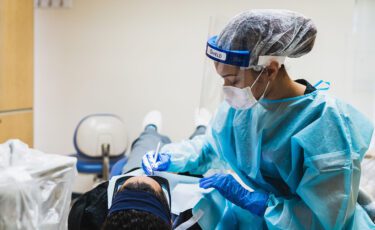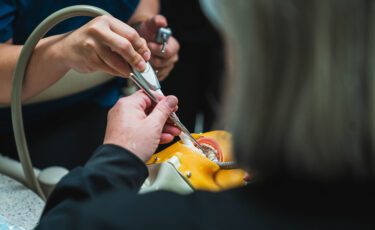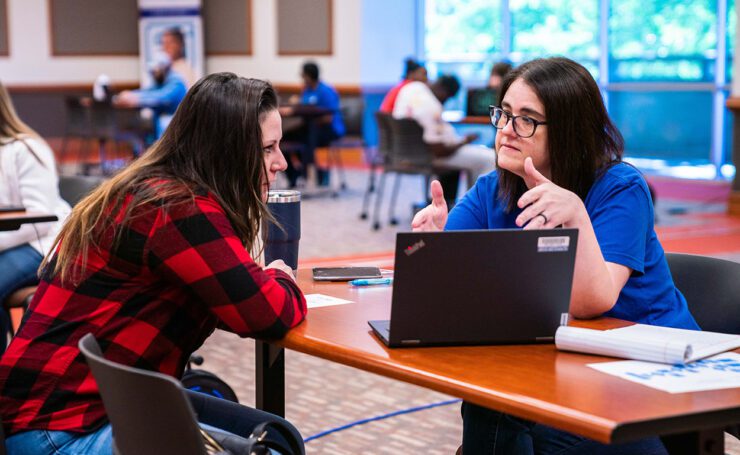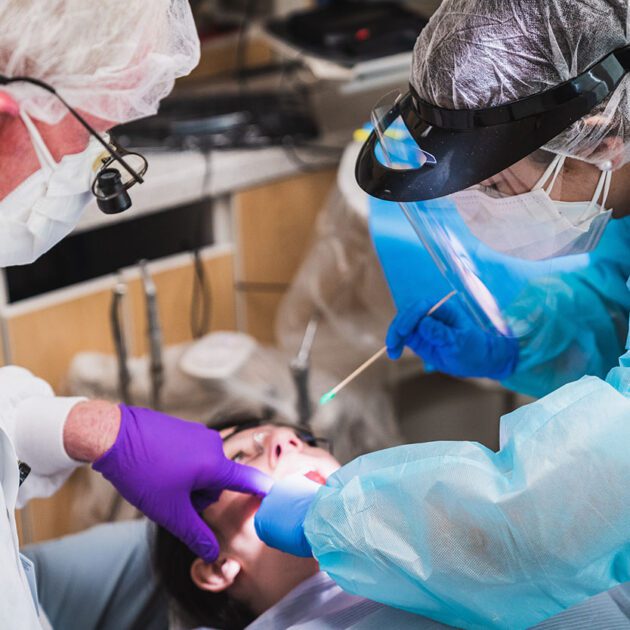Why study dental assisting or dental hygiene?
Dental assistants work alongside dentists to perform a variety of tasks, including preparing patients for treatment, sterilizing equipment, and assisting with procedures. Dental hygienists work independently to perform cleanings, take X-rays, and educate patients on oral hygiene.
Both fields require specialized training and may offer certification or licensure options. Dental assistants and hygienists work in dental offices, clinics, and hospitals.
See our Minimum Admission Requirements for Dental Assisting and Dental Hygiene.
Degrees & Certificates

Dental Hygiene
Associate Degree in Applied Science
Time to Complete:
Two years
Schedule:
Day classes
An associate degree in dental hygiene prepares students for a rewarding career focused on oral health. From patient care and oral hygiene instruction to X-rays and preventive treatments, students learn the essential skills to provide comprehensive dental hygiene care and promote confident smiles.

Dental Assisting
Diploma
Time to Complete:
One year
Schedule:
Day classes
Prepare for a variety of positions in a dental office with your dental assisting diploma! Instruction includes biomedical sciences, dental sciences, clinical sciences and clinical practice. Students will gain knowledge in infection/hazard control, radiography, dental materials, preventive dentistry and clinical procedures.
$40,000 – $60,000
Average yearly salary range
5-6 %
Job growth
200
Job openings
Career Tracks
- Dental Assistant
- Dental Hygienist
- Dental Lab Technician
- Dental Office Administration

Get the education you deserve without spending your days worrying about how to afford it. Our financial aid team can help you chart a path to paying for college, including through debt-free grants and scholarships.

The Forsyth Tech Cares program supports students so they can succeed, including access to financial assistance, health services, and confidential counseling.
Dental Hygiene Program Mission, Goals & Outcomes
The Dental Hygiene Program provides quality education and opportunities for the Dental Hygiene student to be successful in the program. The program will provide an environment to promote the team concept, encourage professional and ethical behavior, lifelong learning, and the development of the skills and attitudes necessary to achieve the student’s goal of becoming a Registered Dental Hygienist.
The Dental Hygiene goals/outcomes and competencies have been planned with the goals and objectives which are consistent with the goals and objectives of the institution and that are appropriate for dental hygiene education that address teaching, patient care, research and service.
These program goals, competencies, and philosophy are listed in the D.H. Clinic Manual.
- Graduates of the Dental Hygiene Program will be able to demonstrate a sound grasp of basic skills and knowledge in the basic sciences, dental sciences, general education and dental hygiene science.
- 85% of the Dental Hygiene Program graduates taking the Dental Hygiene National Board will pass the exam.
- Graduates of the Dental Hygiene Program will be technically proficient.
- At the close of their final term, 100% of the graduates will be able to practice dental hygiene with a 78% proficiency as directed by the Dental Hygiene faculty.
- 85% of the Dental Hygiene Program taking a State Licensure Examination will pass the exam.
- Graduates of the Dental Hygiene Program will be employed in the field.
- 50% of the graduates of the Dental Hygiene Program will report employment in the field on the Graduating Student Survey administered at the time of program completion.
- 75% of the graduates of the Dental Hygiene Program will report employment in the field on the Student Survey distributed one year after graduation.
- Employers of the Dental Hygiene Program graduates will rate the technical and academic skills of the employees as average or above.
- 75% of the respondents of the Employers Survey conducted each year will respond that they would employ future graduates of the Dental Hygiene Program.
- A majority of the respondents of the Employers Survey will respond by rating the graduates as average or above.
A Dental Hygiene graduate must be able to:
- Apply a professional code of ethics in all endeavors.
- Practice as a member of a team in a professional manner.
- Acquire and analyze information in a scientific manner.
- Collect, analyze, and record data on the general, oral and psycho-social health status of clients using methods consistent with medical, legal and ethical principles.
- Use critical decision making skills to determine the client’s needs related to their oral health and disease, based on available data.
- Formulate a comprehensive dental hygiene care plan, through consultation with the client and other health professionals. The care plan will identify evidence based dental hygiene interventions.
- Provide individualized care that includes educational, preventive and therapeutic services designed to assist the client in achieving and maintaining oral health.
- Evaluate the effectiveness of educational, preventive, and therapeutic services and modify as needed.
- Promote the values of oral and general health to the public and organizations.
- Assume responsibility for health promotion and disease prevention to the public and organizations within and outside the profession.
- Demonstrate professional commitment and advancement within the profession.
Dental Assisting Mission, Goals & Outcomes
The Dental Assisting Program provides quality education and opportunities for the Dental Assisting students to be successful in the program. The faculty and staff will encourage professional and ethical behavior. The program will provide an environment to promote the team concept, lifelong learning, and the development of the skills and attitudes necessary to achieve the student’s goal of becoming a Certified Dental Assistant.
- Acquire knowledge and skills necessary to provide a safe environment for clients and dental staff.
- Master basic dental theory and competencies for successful completion of the Dental Assisting National Board exam
- Develop and refine skills in chairside, clinical, radiographic, and laboratory procedures.
- Acquire knowledge and skills to promote and participate in preventive dental care.
- Promote the dental team concept and understand the importance of professional conduct and ethics.
- Promote personal commitment to contouring education and educational advancement.
- Successfully complete the dental assisting program.
The dental assisting curriculum prepares individuals to assist the dentist in the delivery of dental treatment and to function as integral members of the dental team while performing chairside and related office and laboratory procedures. Common program outcomes include:
- 100% of graduates in 2019 were satisfied with the quality of instruction as reported on exit survey’s.
- 100% of graduates in 2019 had job offers at the time of graduation.
- 97% of graduates passed all three components of the Dental Assisting National Board on the first attempt.
This program has limited enrollment of 20 new students that are accepted in the Fall semester class. Students are chosen by a selective admissions process based on grades earned in required related courses (i.e. biology, communications, and psychology). The Admissions Office can provide additional information on the selection process and the deadline requirements.
The Dental Assisting students are required to maintain a “C” average in both lecture and laboratory in order to satisfactorily complete any course in the dental assisting curriculum.
Accreditation does require a specific number of class, lab, and clinical hours for the student to graduate, so there are strict attendance rules. If the student surpasses the allowed number of hours missed, they will be dropped from the program and will have to re-apply to the program for the next year. Re-admission may be possible, but requires re-application and approval from the college.
100% of the program graduates that have continued their education and entered the workforce were employed within six months of graduation. The majority of the graduates are employed in the triad region or near their residence in outlying counties. “Job prospects for dental assistants should be excellent. In addition to job openings due to employment growth, numerous job openings will arise out of the need to replace assistants who transfer to other occupations, retire, or leave the labor force for other reasons. Population growth and greater retention of natural teeth by middle-aged and older people will fuel demand for dental services.
“Through the Dental Hygiene program, I’ve met passionate and kind instructors, peers and staff as I learn and prepare for my future career.”
Joohie K.
Visit us today!
Forsyth Tech is located at:
2100 Silas Creek Parkway,
Winston-Salem, NC 27103
